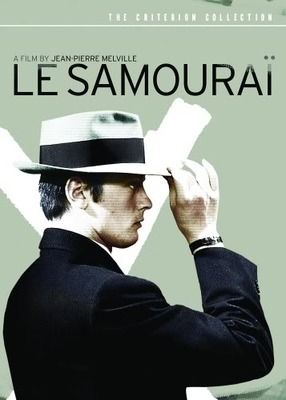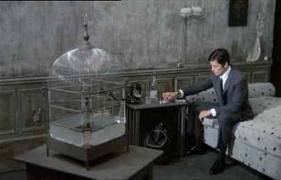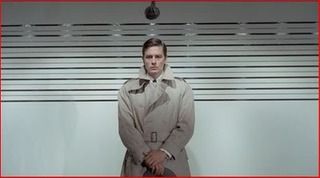
Le Samouraï
1967
Director: Jean-Pierre Melville
Starring: The too-pretty-for-his-own-good Alain Delon
I have found that when it comes to watching quiet, intense dramas, it helps to be rather tired when watching them. I know that may sound a little weird, but the idea is that you’re not distracted by having too much energy. You’re not jumping around in your seat, and you can really settle into the film. It helps enormously when watching intense but slow-moving fare like Le Samouraï.
Why do I mention that? Because if you’re in the right frame of mind when watching a film, it can make or break the experience. For me, it completely made Le Samouraï. I encourage you to check it out under similar circumstances.
What a unique film. Made in the late sixties, in many ways, it’s Frenchman Jean-Pierre Melville’s homage to film noir - the main character, Jef Costello, played by the shockingly beautiful Alain Delon, even shares the first name of Robert Mitchum’s character from the noir classic Out of the Past - but there’s so much more to it than simply shades of noir. Evoking the title, there are numerous shades of the lone Japanese warrior in Delon’s character, an almost otherworldliness that brings to mind great spy cons. Jef is preternaturally aware of his surroundings, as, I imagine, a Japanese warrior would be. And yet, for all this seriousness, there is a also great deal of odd little French pop culture touches; in one scene, I almost laughed at the impossibly loud Orangina billboard plastered squarely in the backdrop. So noir-slash-samurai-slash-pop culture. I know it sounds improbable, but it works.
Jef Costello is a hitman. Cold, calculating, the movie opens with him meticulously building his alibi and preparing for his latest hit. The rest of the film is involved in the police investigating the murder and a doublecross by the men who ordered the hit.
Costello is absolutely fascinating. He lives in an apartment that looks like an illustration from an Edward Gorey book; grey, drab, rundown, practically black and white. Even the pet bird Costello keeps is grey. Melville himself said he always wanted to make a black and white film in color, and he has certainly succeeded here. And yet, for all his drab apartment trappings, Jef himself is well-kempt; before he leaves, Costello slowly and carefully dons his fedora, ensuring a perfect crease. Evoking the great film noir characters like Marlowe and Spade, Costello turns up the collar of his classic trenchcoat against the rain and the grey of the outdoors.

Costello barely speaks a dozen lines in the entire film. Stoic, reserved, quiet, he only speaks out of bare necessity, and every word is calculated, though not necessarily true. Costello says he always wins. This is a French film, after all; we know that he must lose. Melville says that Costello is a schizophrenic; I don’t entirely see it. I do, however, think that Costello lives in his own private universe, one that his lover, the police, and even the hitmen sent after him cannot touch. The only person who seems to have some hold over Jef is a nightclub singer who is the only legitimate witness to Jef’s hit. When she point blank tells the police that Jef is not the man who did the killing, he is caught in her trap. She is the only person who seems to have some means of penetrating Jef’s cold façade.
In many ways, having taken a liking to some of the latest spy and con-men television series on the air, I was reminded very forcibly of that genre while rewatching Le Samouraï. Jef Costello, although not technically a spy, has that shrewd, observant brain that makes a good spy overly aware of his surroundings. What’s more, his main opponent in the film, an equally shrewd police chief who doesn’t buy Jef’s airtight alibi for a second, is a formidable opponent. Sans doubt, a high point of the film is an elaborate and taut game of cat and mouse through the Paris metro. Jef figures out that someone is tracking him; problem is, the person keeps changing from station to station. We watch the police chief tracking Jef through the underground back at the station, and catch our breath when it seems that Jef hasn’t figured out who his latest stalker is. Not to fear, however; Jef, like Michael Westen or Nate Ford, can outsmart his opponent. Well, with the one exception of the nightclub singer.

Yes, Jef Costello, for all his intelligence, ultimately has a flaw, one that brings him down as in all the classic noirs. Is he in love with the mysterious nightclub singer? No, that would be too easy for a character as complex as him. It would almost be a disgrace. In several essays on the film, different reviewers refer to the nightclub singer as a personification of Death. Interesting idea, and one which certainly echoes the earlier French favorite of mine, Cocteau’s Orpheus from 1948. I am not certain if I entirely buy this theory, but it lends an air of the delicious supernatural to this tautly woven film. It is Jef’s fascination with the nightclub singer, however, that does him in, and that is his downfall. We are given hints and clues about who she is through her clothing and the sets in which she appears, but like Jef, we do not put everything the clues together until the end of the film; until it is far too late.
Although made in the same era as the great French New Wave films, Le Samouraï doesn’t quite fit the same bill. It has too strong a narrative, and it doesn’t play with the metaphysics of “You are watching a movie” in the same way as, say, Godard did. It works much better in the crime film genre, and it’s a fantastic entry. Having said that, it’s still an oddity: it’s a crime film that doesn’t focus on crime, it’s a film about a hitman that has shockingly little violence. Ultimately, it doesn’t matter: we are enraptured with Jef and his strange little black and white world.
Plus did I mention that Alain Delon is very, very pretty?
Arbitrary Rating: 9.5/10
Appreciate the thoughts. Just watched the film and was curious what others thought about the ending.
ReplyDelete